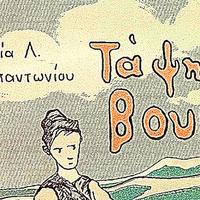24. Οι Ζαβοπαναγήδες
|Zavopanagides
24. The Zavopanagides
24. Los Zavopanágidas
24. Les Zavopanagides
24. Zavopanagides
24. Os Zavopanagídeos
24. Zavopanagidler
Όταν τελείωσαν τους δρόμους τα παιδιά, πήραν τα εργαλεία και κατέβηκαν στο Μικρό Χωριό για να τα δώσουν πίσω.
when|finished||roads|||took||tools||they went down|||||||give|back
When the children finished the roads, they took the tools and went down to the Little Village to give them back.
Φτάνοντας στην πλατεία, είδαν τον Ζαβοπαναγή.
arriving at||square|||Zavopanagi
Arriving at the square, they saw Zavopanagi.
Είχε πάρει με τη γνώμη του άλλους τέσσερις χωριανούς.
had|taken|||opinion||||villagers
He had taken with his opinion four other villagers.
Φώναζαν κι αυτοί στον προεστό πως τον δρόμο δεν πρέπει να τον διορθώσουν οι κάτω χωριανοί, μα οι χωριανοί της απάνω συνοικίας.
They shouted||||village chief||||||||they should fix||below|||||||upper neighborhood
They were also shouting at the village head that the road should not be repaired by the villagers below, but by the villagers of the upper neighborhood.
Όλο «πρώτο μεν» έλεγαν.
always|first|on the one hand|they said
They kept saying, 'first of all.'
—Πρώτο μεν, ο νόμος το λέει αλλιώς.
first|first|the|law|||
-First of all, the law says otherwise.
—Πρώτο μεν (πάλι «πρώτο μεν!»), αν περάσει ο δρόμος λίγο παραπάνω, μας παίρνει τρεις πιθαμές κτήμα.
first|first||first|||passes||||above||takes||three spans|property land
-Zuallererst (wieder "zuallererst!"), wenn die Straße ein wenig weiter geht, nimmt sie drei Markierungen von uns.
-First of all (again "first of all!"), if the road goes a little further, it takes three pithes from us.
—Τρεις πιθαμές πέτρα, είπε ο προεστός.
three|three feet|stone|||chief
-Three stone pebbles, said the foreman.
—Πέτρα ξεπέτρα είναι κτήμα μας.
Stone|stone property||property|
-Petra is our property.
-Petra est notre propriété.
—Taş taş olmaktan çıkmıştır, bizim mülkümüzdür.
—Τότε ας μη σας πάρει την πέτρα, ας περάσει απέξω.
|||you|takes||||pass by|outside
-Then let him not take the stone from you, let him pass by.
—O zaman taştan almayın, dışarı geçsin.
—Να περάσει απέξω; Καλά, έλεγε ο Ζαβοπαναγής.
|pass by|outside||said||Zavopanagis
-Can he go outside? Well, said Zavopanaggi.
—Dışarı mı geçsin? İyi, Zavozpanagis diyordu.
Μα έλα δω: Πρώτο μεν... ο νόμος, τι λέει ο νόμος;
But come here: First of all... the law, what does the law say?
Κι αυτός δεν ήξερε τι λέει.
|||knew||
And he didn't know what he was saying.
Ωστόσο έβγαλε από τον κόρφο του μια φυλλάδα.
However|took out|from||bosom|||pamphlet
However, he pulled out a leaflet from his bosom.
Κι επειδή δεν ήξερε να τη διαβάσει, την κοπάνιζε μέσα στις δυο παλάμες του.
|because||didn't know|||read||he clapped||||palms|
And because he didn't know how to read it, he was running away in his two palms.
Φώναζε πως αυτός εννοεί να πάει με τον νόμο.
He shouted|||intends to|||||law
He shouted that he meant to go with the law.
Ζαβοπαναγής ήταν με τ' όνομα.
Zavopanagis was the name||||
Zavopanaggi was the name.
Για το πείσμα του μπορούσε να χαλάσει το χωριό.
||stubbornness||||to ruin||
For his stubbornness he could ruin the village.
Όλα τα κοινοτικά έργα τα κυνήγησε.
||community|projects||chased
All the community projects he went after.
Και όμως, άμα τον λένε Ζαβοπαναγή θυμώνει και σηκώνει τη μαγκούρα του.
||if when||they call|Zavopanakis|gets angry||raises||club stick|
And yet, when he is called Zavopanagi, he gets angry and raises his barge.
Στο τέλος πήρε τους τέσσερις χωριανούς με το μέρος του.
||took||four|villagers|||side|
In the end he got the four villagers on his side.
Από ένας έγιναν πέντε Ζαβοπαναγήδες.
||became|five|Zavopanagides
One became five Zavopanagas.
Όταν τους είδαν πέντε οι άλλοι χωριάτες εκείνο το πρωί, θύμωσαν κι αυτοί.
||saw|five|||villagers|that|||got angry||
When the five other villagers saw them that morning, they too were angry.
«Να πάτε στο καλό» είπαν «Ζαβοπαναγήδες!
to|go||good place|they said|
"Go to hell" they said "Zavopanagans!
Δε σας χρειαζόμαστε, θα τον φτιάξουμε εμείς τον δρόμο.
||we need|||we'll fix|||
We don't need you, we'll fix the road.
Περισσότερη είναι η γκρίνια σας απ' το καλό σας».
more|||complaining||||good|
More is your grumbling than your good."
Ξεκίνησαν εφτά οχτώ με τα εργαλεία και πήγαν στον χαλασμένο δρόμο.
started|seven|eight|||tools|||to the|broken|
They started at seven-eight with the tools and went to the broken road.
Μα ήταν αργά.
||late
But it was too late.
Τα παιδιά τον είχαν διορθώσει μια μέρα πριν.
||||corrected him|||
The boys had corrected him the day before.
Μήπως δεν ήταν και δική τους ωφέλεια να το κάνουν; Κι αυτά περνούσαν από ‘κεί.
maybe||||||benefit||||||were passing||
Was it not also to their benefit to do so? They were going through there too.

